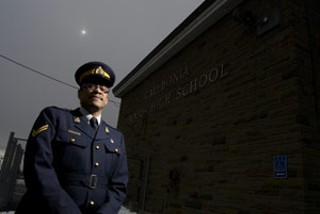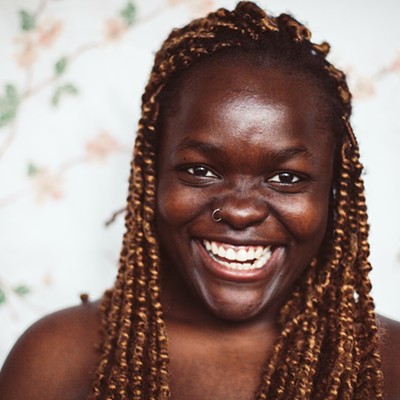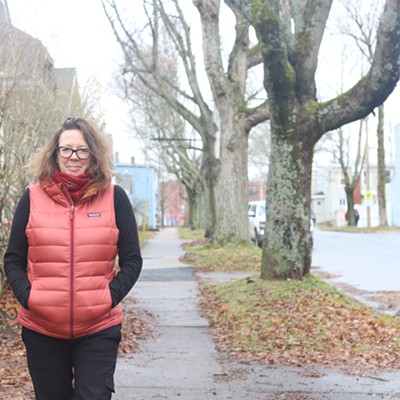It takes 15 minutes for Craig Smith to make it as many feet---from the circulation desk at Halifax North Memorial Public Library to a small office by its entrance.
The problem---if you can call it that---is people keep stopping the RCMP corporal to chat. He worked at this Gottingen Street branch for 12 years as the community youth worker. He grew up nearby on Bauer Street. “This is my community,” he says, dressed in a pressed uniform and taking a seat after giving a presentation, “Black Firsts in Nova Scotia.” He developed it in 1991 as a library employee. A Dartmouth High School student, Carlos Beals, 17 years old and with an interest in joining the RCMP, sits in the office, too. He’s been spending the day with Smith.
Next Tuesday, Smith will share his experience trying to get his book You Had Better Be White By 6 A.M.: The African-Canadian Experience in the RCMP into junior and high school classrooms in Nova Scotia.
At first, Smith failed to get the book approved by the Department of Education, a prerequisite to widely distributing it to teachers and students. There’s a small provision and budget allocation---one report puts it at five percent of a school board’s book budget---for “non-approved books.” Smith hand-delivered and self-promoted the title to school boards, principals and teachers.
You Had Better Be White was initially shut out from the approved list because it contained the word “nigger.” The slur was printed in the context of a 1946 story about Viola Desmond, who decided she would not sit in “nigger heaven”---the term used by black and white people, says Smith, for the balcony of a movie theatre in New Glasgow. Police showed up and arrested her, which made the story a perfect example of how “Every time something’s happened historically the police usually show up in a negative role.” The book is also, Smith points out, about the good police can do.
Prior to its publication in September 2006, Smith showed a draft to staff at the African Canadian Services Division of the Department of Education. “So I make that reference and I spell the word out. It’s that way in the draft on that page. There’s no red mark, no ink. We even discuss the fact the word could encourage discussion in the classroom.”
The book went to print. Then, as per process, Smith sent in five copies to be evaluated by a panel of teachers. “I start to hear grumbling about the title---that it might start arguments in the classroom. Some people might not be happy that the word ‘nigger’ is in the book. But I’m not hearing anything concrete yet.”
After repeated requests, Smith found out his book was rejected for broad approval by the Department of Education. “My use of the word…no, my spelling out of the word, made some in the evaluation unhappy. Basically it wasn’t going to be authorized for student reading lists unless I altered the word altogether.”
So, that’s what he did, but he had to reprint the book at his own cost, which he sets at around $6,500. The Black Educators’ Association subsidized the new print run. “As it appears now, it’s an ‘n’ with five asterisks after it. You think you still don’t know what the word is?”
Smith remembers the day his book was approved. “May 29 last year it was added to the reading list as a classroom resource in African Canadian studies, law and English, I believe.” But the Department of Education hasn’t bulk-ordered the book. It’s also not being promoted to teachers, Smith says. “You may get approved to go to the Book Bureau, where individual teachers may order them,” explains Gloria Wesley (Burlap & Lace), a poet and teacher of 32 years.
“Black literature is not mandatory for students to read and the two black academic courses being offered in high schools are not compulsory for students to get credits for. Even when some black books were donated, I found them sitting in unopened boxes years later in schools where I taught.”
“I should be able to, and do, talk about the interaction with the actual dialogue that was used, says Wesley. “The ‘n-word’ is a really dumb abbreviation for ‘nigger.’”
Craig Smith remains convinced his book belongs in school classrooms. “It’s not just black history: It’s Canadian history.”













